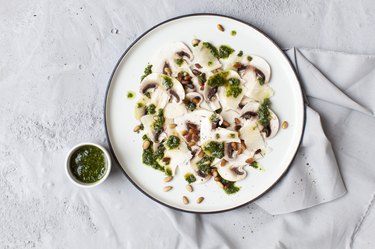
When it comes to fruits and veggies, generally the brighter the color, the more nutritious. However, white mushroom nutrition breaks with that concept. These relatively dull and colorless veggies come packed with nutrition.
White Mushroom Benefits
Video of the Day
White mushroom benefits include helping your bones by boosting your copper and phosphorus intakes, according to the University of Pittsburgh Medical Center (UPMC). These minerals have distinct roles in skeletal health; phosphorus contributes to the inorganic mineral tissue that provides bone density, while copper helps you make collagen, a protein that keeps your bones from becoming brittle, according to the Linus Pauling Institute.
Video of the Day
Both minerals also aid in energy production, and phosphorus helps you make DNA. A cup of whole white mushrooms provides 86 milligram of phosphorus, or about 12 percent of your daily intake requirement, according to the USDA National Nutrient Database and the Linus Pauling Institute. Mushrooms are one of the best sources of selenium found in the supermarket produce section, according to the Colorado Integrated Food Safety Center of Excellence.
Add white mushrooms to your diet and you'll also consume more B-complex vitamins, according to UPMC. They're a good source of riboflavin, niacin and pantothenic acid, which help to provide energy by breaking down fats, proteins and carbohydrates. Mushrooms are also a good source of potassium, which helps to control blood pressure.
Antioxidant and Other Benefits
White mushrooms also house a range of beneficial antioxidants. Chemicals with antioxidant function fight oxidation — which prevents or delays cell damage, according to MedlinePlus. White mushrooms contain the antioxidant ergothioneine and glutathione, according to a Penn State University report. While white mushrooms don't have as much as other types of mushrooms, the report states, they do contain more than most foods.
The Penn State report chronicles the details of a study, published in the October 2017 issue of the journal Food Chemistry, which indicates that mushrooms are the highest dietary source of these two antioxidants. Cooking the mushrooms doesn't significantly alter their beneficial effects, according to the Penn State report.
This antioxidant effect means it helps the body to replenish antioxidants, the Penn State report states. That's important because when the body uses food to produce energy, that causes oxidative stress, because free radicals are produced. When you eat food high in antioxidants, this may help protect the body from that stress, according to the report.
Read more: Is Eating Too Many Mushrooms Dangerous?
Consuming More White Mushrooms
Their meaty texture helps add body to your meals, but their low calorie content of 22 calories per cup means the calories in white mushrooms won't expand your waistline. Incorporate these into your cooking and enjoy several benefits associated with their nutrient content. Mushrooms are often considered to be a meat substitute because of their texture and protein content, according to Colorado Integrated Food Safety Center of Excellence.
Use white mushrooms' meaty texture to your advantage in the kitchen. Use sauteed mushrooms in place of some of the ground beef in homemade meat sauce for pasta, because you'll lower the sauce's calorie and fat content.
Combine sauteed white mushrooms and onions, breadcrumbs and lentils in a food processor for meaty vegetarian burgers, or use seasoned cooked white mushroom slices in place of meat in fajitas or tacos. Alternatively, simply drizzle white mushrooms in olive oil, wrap them in tinfoil and then barbecue until tender.
- Linus Pauling Institute: "Copper"
- Linus Pauling Institute: "Phosphorus"
- Linus Pauling Institute: "Pantothenic Acid"
- Pens State University News: "Mushrooms Are Full of Antioxidants That May Have Anti-Aging Potential"
- Colorado Integrated Food Safety Center of Excellence: "Mushrooms"
- University of Pittsburgh Medical Center Health Beat: "6 Reasons That Mushrooms Make an Awesome Addition to Any Meal"
- USDA National Nutrient Database: "Mushrooms, White, Raw"
- Food Chemistry: "Mushrooms: A Rich Source of the Antioxidants Ergothioneine and Glutathione"
- MedlinePlus: "Antioxidants"